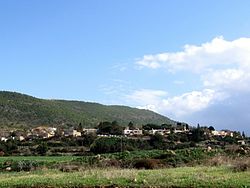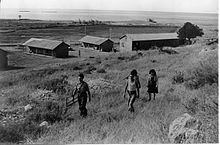LIMSwiki
Contents
Rosh HaNikra
רֹאשׁ הַנִּקְרָה | |
|---|---|
 | |
| Etymology: Head of the Grottoes | |
| Coordinates: 33°5′10″N 35°6′59″E / 33.08611°N 35.11639°E | |
| Country | |
| District | Northern |
| Council | Mateh Asher |
| Affiliation | Kibbutz Movement |
| Founded | 6 January 1949 |
| Founded by | Demobilised Palmach members |
| Population (2022)[1] | 1,422 |
| Website | www.rosh-hanikra.com |
Rosh HaNikra (Hebrew: רֹאשׁ הַנִּקְרָה) is a kibbutz in northern Israel. Located on the Mediterranean coast near the Rosh HaNikra grottoes and the border with Lebanon, it falls under the jurisdiction of Mateh Asher Regional Council. In 2022 it had a population of 1,422.[1]
History
The kibbutz was established on 6 January 1949 by a gar'in of demobilised Palmach soldiers who moved there from Kibbutz Hanita, along with Zionist youth movement members and young Holocaust survivors.
It was built on the village lands of al-Bassa, which was depopulated in the 1948 Arab–Israeli War.[2]
2023 Israel–Hamas war
During the 2023 war between Hamas and Israel, northern Israeli border communities, including Rosh HaNikra, faced targeted attacks by Hezbollah and Palestinian factions based in Lebanon, and were evacuated.[3]

In January 2024, Hezbollah released a video of a strike on the Israeli naval base at Rosh Hanikra, on the border with Lebanon, saying it had used an Almas missile. Several subsequent videos over the spring 2024 also show to deploy the guided missile against Israeli targets. [4]
Economy
The kibbutz grows bananas and avocados, and raises turkeys. In 1974, kibbutz members founded a biotechnology company called Rahan Meristem, which included the first commercial tissue culture laboratory in the country. Rahan developed new procedures for large scale, in-vitro, clonal propagation of over 200 plant genera including ornamental, industrial, fruit, and vegetable crops. In the mid-1980s, in-vitro propagated banana plants became the leading product. Rahan is now a center of research and consultation for the banana industry throughout the world. A formal R&D department was established in 1991 to provide technical support. Areas of expertise include molecular and classical genetics, plant cell and tissue culture, plant biochemistry and physiology, bacteriology and industrial biotechnology. Methods have also been developed for the control of contaminating microbes, early detection and elimination of somaclonal variation, reduction of labor and fixed costs in production, etc.[5]
In the early 21st century, the kibbutz was privatized.
Notable people
- Sacha Baron Cohen, English actor, comedian, screenwriter, and producer[6]
- Nufar Edelman (born 1982), Olympic sailor
- Eitan Friedlander (born 1958), Olympic sailor
- Dekel Keinan, Israeli footballer
See also
References
- ^ a b "Regional Statistics". Israel Central Bureau of Statistics. Retrieved 21 March 2024.
- ^ Khalidi, Walid (1992). All That Remains: The Palestinian Villages Occupied and Depopulated by Israel in 1948. Washington D.C.: Institute for Palestine Studies. pp. 8–9. ISBN 0-88728-224-5. ISBN 0-88728-224-5.
- ^ IDF to evacuate civilians from 28 communities along Lebanese border amid attacks
- ^ "Hezbollah Believed to Be Using Copy of Israeli Missile Against Israel". The New York Times.
- ^ Matimop, Rahan Meristem
- ^ Heller, Aron. [1]: Israelis Dig 'Borat,' Jokes in Hebrew. 2006-12-14. Retrieved on 2008-12-29
External links
- Kibbutz website
- Rosh HaNikra Jewish Agency



















